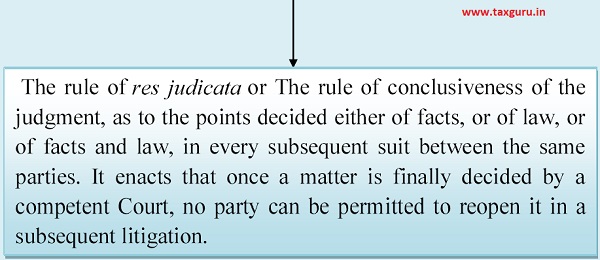As per Wikipedia – Res judicata (RJ) or res iudicata, also known as claim preclusion, is the Latin term for “a matter [already] judged” and refers to either of two concepts: in both civil law and common law legal systems, a case in which there has been a final judgment and is no longer subject to appeal; and the legal doctrine meant to bar (or preclude) relitigation of a claim between the same parties.
Wikipedia further explains that In the case of res judicata, the matter cannot be raised again, either in the same court or in a different court. A court will use res judicata to deny reconsideration of a matter. The doctrine of res judicata is a method of preventing injustice to the parties of a case supposedly finished but perhaps also or mostly a way of avoiding unnecessary waste of resources in the court system. Res judicata does not merely prevent future judgments from contradicting earlier ones, but also prevents litigants from multiplying judgments, and confusion.
Res- Judicata
Relevant Provision: Section 11 of the Code of Civil Procedure, 1908 
Res- Judicata: Res Judicata’ thus means ‘a matter adjudged’ or ‘a dispute decided
1. The principle of res judicata is based on the need of giving a finality to judicial decisions.
2. What it says is that once a res is judicata, it shall not be adjudged Primarily it applies as between past litigation and future litigation.
3. When a matter, whether on a question of fact or a question of law, has been decided between two parties in one suit or proceeding and the decision is final, either because no appeal was taken to a higher Court or because the appeal was dismissed, or no appeal lies, neither party will be allowed in a future suit or proceeding between the same parties to canvass the matter again.
Section-11 of CPC, 1908


Object of Res judicata
1. The doctrine of res judicata is conceived in the larger public interest which requires that all the litigation must, sooner than later, come to an end.
2. The principle is also founded on justice, equity and good conscience which require that a party who has once succeeded on an issue should not be harassed by multiplicity of proceedings involving the same issue.
3. The doctrine of res judicata is based on 3 maxims:

Extent and Applicability
1. The doctrine of res judicata is a fundamental concept based on public policy and private interest.
2. It is applicable to-
a. civil suits,
b. execution proceedings,
c. arbitration proceedings,
d. taxation matters,
e. industrial adjudication,
f. writ petitions,
g. administrative orders,
h. interim orders,
i. criminal proceedings etc.
Essential Conditions of Res Judicata
1. The matter directly and substantially in issue in the subsequent suit or issue must be the same matter which was directly and substantially in issue either actually or in the former suit.
2. The former suit must have been a suit between the same parties or between parties under whom they or any of them claim.
3. Such parties must have been litigating under the same title in the former suit.
4. The Court which decided the former suit must be a Court competent to try the subsequent suit or the suit in which such issue is subsequently raised.
5. The “matter directly and substantially in issue”in the subsequent suit must have been heard and finally decided by the Court in the former suit.
Matter directly and substantially in issue
1. The expression “matter in issue” means the rights litigated between the parties, e.,the facts on which the right is claimed and the law applicable to the determination of that issue. Such issue may be an issue of fact, issue of law or mixed issue of law and fact.
2. A matter directly and substantially in issue in a former suit will operate as res judicata in a subsequent suit. The term ‘directly’ has been used in contradistinction to ‘collaterally or incidentally.
3. A fact cannot be said to be directly in issue if the judgment stands whether that fact exists or does not exist.
4. No hard and fast rule can be laid down as to when a matter can be said to be directly in issue and it depends upon the facts and circumstances of each case.




